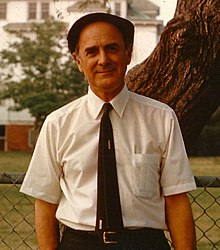William H. Rorer, Inc.
William H. Rorer, Inc was an American multinational pharmaceutical company headquartered in Fort Washington, Pennsylvania. It was founded in 1910 by William H. Rorer, a Pennsylvania pharmacist.[1] The business operated as a small concern, primarily selling pain relievers manufactured elsewhere. It wasn't until after World War II that the company's fortunes forever changed with the introduction of Maalox which would become the world's best selling antacid.[2]
History
[edit]
William H. Rorer founded William H. Rorer, Inc. in 1910 while working as a pharmacist in Pennsylvania. The business remained small, primarily selling pain relievers until 1949 when it introduced Maalox. Maalox was developed in collaboration between William H. Rorer, Inc. and a medical doctor and researcher specializing in gastrointestinal issues, Alison Howe Price from Philadelphia.[3] The collaboration came about after World War II when Claude Newhart, a salesman and pharmacist for the company had an idea that he thought might change the company’s fortunes. According to the Rorer family, he suggested that instead of selling pain relievers that the company didn’t manufacture, they should create their own products. Gerald Rorer, president of Rorer and son of the founder, told Mr. Newhart to “go and find something.” Mr. Newhart took up the challenge and contacted an old acquaintance from his student days employed at a drugstore in Philadelphia, Martin H. Rehfuss, who happened to be chief of medicine at Thomas Jefferson Hospital. It was Mr. Rehfuss who introduced Mr. Newhart to Dr. Price. It wasn’t long before Mr. Newhart convinced Price to become a consultant for the Fort Washington, Pennsylvania based William H. Rorer, Inc. And it so happened that the first product the partnership produced was Maalox.[4][5] It eventually would become the world's best selling antacid and forever change the company's fortunes.[6]
In 1965 the company introduced Quaalude (quiet interlude), similar in spelling to its top-selling antacid, Maalox, but it turned out to be far less successful for the company. The FDA withdrew Quaalude in 1984.[7]
Headquarters
[edit]Rorer's was headquartered in Fort Washington, Pennsylvania.[8]
- Ascriptin
- Asopophen
- Aurasol-Improved
- Barbival
- Bronchisote
- Carbathiazole Ointment
- Cardaspirin
- Carfusin
- Chardonna
- Cleansitone
- Cocillanol w/Dionin
- Comfortine
- Diasystol
- Dionicol
- Disulfyn
- Duomin
- Estraldine
- Factimin
- Febritabs
- Fenotal]]
- Fermalox
- Glanditon
- Glyphos
- Hepasal
- Lumaspirin
- Lumaspirin w/Hyoscyamus
- Maalox
- Mellisen
- Mertricone
- Neoxyn
- Neutraline
- Nicarimin B
- Nurokardiac
- Oralplex
- Paadon
- Paraldehyde Ampul
- Parepectolin
- Phedralixir
- Phedretal
- Precibus Capsule
- Probutylin
- Procaine Butyrate Ointment
- Procaine Butyrate Suppositories
- Quaalude
- Salisicarb
- Santhalein
- Sedadyne
- Solviplex-Strong
- Sulfalozenge
- Supranephrin
- Teretone
- Theacitin
- Thiaminims
- Thiamintol
- Thylogen Maleate
- Trialdin
- Trisidonna
- Vianin
Mergers and acquisitions
[edit]For many years Maalox comprised a large proportion of the drugmaker's sales. In order to diversify, Rorer merged with AmChem in 1968, an agricultural herbicide producer to form Rorer-AmChem. The merger did not turn out to be profitable and in 1977 Rorer sold AmChem to Union Carbide.[10]
By the late 1980s, the pharmaceutical industry had experienced significant mergers, making it very difficult for Rorer to compete. In 1990 the company merged with Rhone-Poulenc SA, France's largest pharmaceuticals' company, for 3.2 billion dollars. At the time of the merger, the Maalox lineup still represented one of the company's most important revenue streams.[11]
References
[edit]- ^ Sally A. Downey (2007-08-30). "William H. Rorer III, pharmaceuticals scion". The Philadelphia Inquirer.
- ^ Wallace, Andy. "Claude Newhart, 87; helped develop Maalox", The Philadelphia Inquirer, Philadelphia, 20 May 1995, p.C7
- ^ Holden, Robert (February 3, 2020). Upper Township and its Ten Villages. Arcadia Publishing. p. 93. ISBN 978-1467104425. Retrieved 26 January 2020.
- ^ Wallace, Andy. "Claude Newhart, 87; helped develop Maalox", The Philadelphia Inquirer, Philadelphia, 20 May 1995, p.C7
- ^ Assistant Commissioner for National and Historic Resources (1989-08-14). "National Register of Historic Places Registration Form". National Park Service.
- ^ Sally A. Downey (2007-08-30). "William H. Rorer III, pharmaceuticals scion". The Philadelphia Inquirer.
- ^ Meghan Ross (2015-07-22). "A Queer History of Quaalude". The Pharmacy Times.
- ^ Uncredited (1981-06-01). "RORER GROUP, MAKER OF MAALOX, WIDENS BASE TO KEEP GROWING". The New York Times.
- ^ Soderlund Drugstore Museum. "William H. Rorer, Inc., Philadelphia 6, Pa". Soderlund Drugstore Museum.
- ^ Thomas Gale (2006). "Rorer Group". International Directory of Company Histories.
- ^ Linda Williams (1990-03-13). "Rorer Will Merge With French Firm in $3.2-Billion Deal". The Los Angeles Times.
